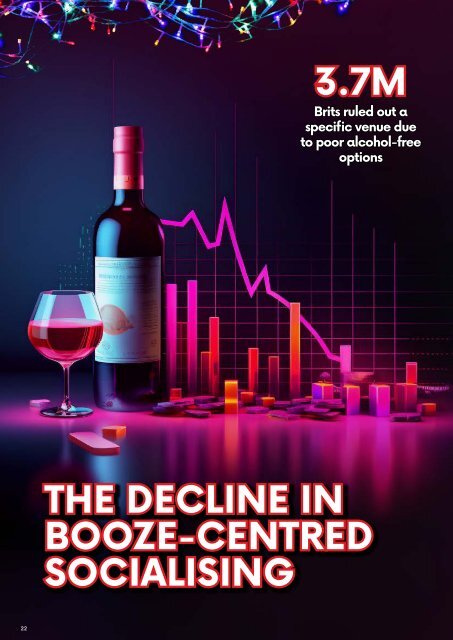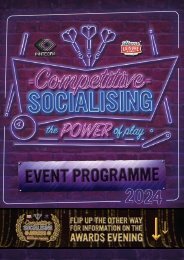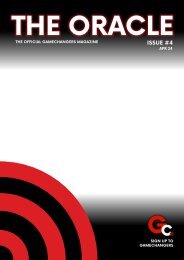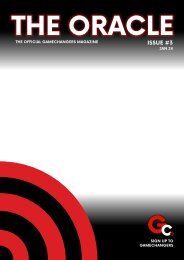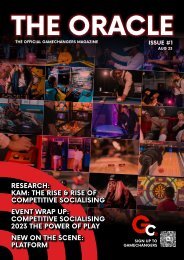The Oracle: Issue #2
You also want an ePaper? Increase the reach of your titles
YUMPU automatically turns print PDFs into web optimized ePapers that Google loves.
THE ORACLE - OCTOBER ISSUE - #02<br />
THE DECLINE IN<br />
3.7M<br />
Brits ruled out a<br />
specific venue due<br />
to poor alcohol-free<br />
options<br />
Does it surprise you that as many Brits moderated their alcohol<br />
income this summer as in ‘Dry January’?<br />
Many are planning to continue<br />
‘moderating’ their drinking across<br />
the upcoming festive season, with<br />
44% of Brits intending to drink less<br />
alcohol during Christmas 2023<br />
compared with 2022. KAM’s recent<br />
report, in partnership with Lucky<br />
Saint, found actively moderating<br />
alcohol consumption is now a yearround<br />
habit for UK adults.<br />
It seems that moderation has hit<br />
the mainstream!<br />
<strong>The</strong>re has been a significant<br />
fall in the number of UK adults<br />
consuming alcohol at least once<br />
a week, with the figure now at<br />
76.9% (down from 90% in 2022).<br />
This equates to a drop of 6.8m<br />
people drinking weekly, with all age<br />
groups reporting a decline in overall<br />
alcohol consumption. Within the<br />
18-24 age group – a core age group<br />
for competitive socialising venues<br />
- the figure has fallen fastest, from<br />
91% in 2022 down to 72% this year.<br />
This coincides with a whole raft of<br />
new consumers entering the low<br />
and no category within the last year<br />
- with 9.7m UK adults (19% of UK<br />
adults) trying low and no alcohol<br />
beer for the first time.<br />
Moderation has most certainly hit<br />
the mainstream and it’s part of a<br />
bigger shift in how we, as a nation,<br />
are spending our leisure time.<br />
We now see a modern consumer<br />
where socialising is not as centred<br />
around drinking culture, who is<br />
more aware of the risks of alcohol,<br />
and therefore is pro-actively taking<br />
action to ensure that they are<br />
drinking at what they consider to<br />
be responsible levels.<br />
But consumers don’t want to miss<br />
out on all the occasions where<br />
alcohol is normally present – going<br />
to the pub with friends, celebrating<br />
a birthday at home, or enjoying<br />
a beer while watching sport, for<br />
example. <strong>The</strong> increasing number<br />
of low alcohol or alcohol-free<br />
options available is therefore being<br />
welcomed with open arms. 30% of<br />
Brits intend to consume alcoholfree<br />
options over the festive period<br />
e.g. alcohol free wine or beer – and<br />
this rises to well over 1-in-3 in the<br />
millennial age bracket.<br />
Despite this long-term growth in<br />
low or alcohol-free occasions,<br />
venues are still at risk of losing<br />
customers, by giving them an<br />
underwhelming experience and<br />
not maximising potential sales<br />
on these low or alcohol-free<br />
occasions due to poor range and<br />
visibility. 3.7 million Brits ruled out<br />
a specific venue in the last three<br />
months alone due to poor alcoholfree<br />
options: totalling a missed<br />
opportunity of over £590.4m<br />
in revenue across the year for<br />
hospitality venues.<br />
During a recent chat with Luke<br />
Boase, founder of Lucky Saint,<br />
he highlighted that “whilst the<br />
low and no market continues<br />
to see tremendous growth, the<br />
opportunity for the UK remains<br />
significant. We trail behind many<br />
European nations in how we<br />
embrace low and no, with the likes<br />
of Spain, Germany and Sweden<br />
having larger market shares for low<br />
and no consumption compared to<br />
the UK.”<br />
Simon Farrow, Category Director<br />
for Tao Hospitality Group (who’s<br />
portfolio includes Hakkasan),<br />
have already taken the bold and<br />
innovative step to ‘zero proof’ their<br />
entire cocktail menu, providing<br />
like-for-like equivalents across the<br />
whole range. Simon proudly states<br />
that “1 in 8 of our cocktails are now<br />
alcohol-free. That’s a £4 to £12<br />
spend increase compared with<br />
people ordering sparkling water<br />
when they don’t want alcohol.”<br />
Venues must ensure they stay<br />
ahead of the curve, or they risk<br />
becoming less relevant for many<br />
potential customers, particularly<br />
Gen Z and Millennials, who tend<br />
to make up the largest proportion<br />
of all competitive socialising<br />
venue customers. <strong>The</strong> research<br />
shows that socialising in the UK is<br />
gradually becoming less alcoholdriven<br />
and more activity-led.<br />
LATEST RESEARCH<br />
BOOZE-CENTRED<br />
SOCIALISING<br />
Katie Jenkins, Marketing &<br />
Partnerships Director of KAM<br />
22<br />
23


